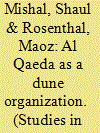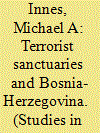| Srl | Item |
| 1 |
ID:
062238


|
|
|
|
|
| Publication |
Jul-Aug 2005.
|
| Summary/Abstract |
Al Qaeda and its affiliated groups offer the analyst a highly complex challenge. The current literature classifies Islamic terrorist organizations as either networked or hierarchical. Yet, this classification fails to account for the appearance on the international stage of a new type of global terrorism. Most notably, it does not capture the structure and mode of operation of Al Qaeda as it emerged after the 2001 U.S.-led assault on Afghanistan. This article therefore introduces a new conceptthe Dune organizationthat is distinct from other organizational modes of thinking. This conceptualization leads to a new typology of Islamic terrorist organizations. This typology concentrates on organizational behavior patterns and provides a framework for a comparative analysis of terrorist movements, which is applied to a study of Al Qaeda, Hizballah, Hamas, and the Palestinian Islamic Jihad.
|
|
|
|
|
|
|
|
|
|
|
|
|
|
|
|
| 2 |
ID:
062254


|
|
|
|
|
| Publication |
Jul-Aug 2005.
|
| Summary/Abstract |
This article examines key provisions of Australia's antiterrorism legislation introduced in the aftermath of the 11 September attacks. Never before in history has Australia witnessed a comparable overhaul of national security legislation and the introduction of laws that significantly curtail civil liberties and fundamental freedoms. A question that thus needs to be addressed is whether or not Canberra's drastic legislative measures are justified by the severity of the terrorism threat to Australia. It is argued that the actual risk of a terrorism attack occurring on Australian soil is rather low. As a consequence, the Howard government's antiterrorism laws constitute a disproportionate response that has worrisome long-term implications for Australia's legal system and its society more generally.
|
|
|
|
|
|
|
|
|
|
|
|
|
|
|
|
| 3 |
ID:
062253


|
|
|
|
|
| Publication |
Jul-Aug 2005.
|
| Summary/Abstract |
This article examines the degree of efficacy of Israel's antiterror policies and ability to cope with terrorism using seven parameters that fall into seven parameters: reduction in civilian casualties among Israelis and Palestinians, Israel's ability to cope economically, Israeli social cohesion, the status of international and domestic support for the Israeli government and the extent of weakening of international and domestic support for the Palestinian leadership. The article concludes that based on most of these parameters, Israel has been successful in coping with terrorism, although greater security must be attained through a change in Palestinian policies.
|
|
|
|
|
|
|
|
|
|
|
|
|
|
|
|
| 4 |
ID:
062252


|
|
|
|
|
| Publication |
Jul-Aug 2005.
|
| Summary/Abstract |
This article argues that a model of terrorism and terrorist sanctuaries rooted in post-9/11 strategic thought and the Global War on Terror is inadequate to the study of terrorism in Bosnia and the Balkans. It addresses a series of conventional assumptions regarding Bosnia-Herzegovina's status as a putative terrorist sanctuary, based on a reading of post-war ethnic politics and political architecture. This assessment turns on the basic notion that terrorism in Bosnia is a complex phenomenon linked to multiple domestic and foreign communities, defined along competing national trajectories and intersecting foreign interests, and subject to evolving political circumstances and priorities.
|
|
|
|
|
|
|
|
|
|
|
|
|
|
|
|